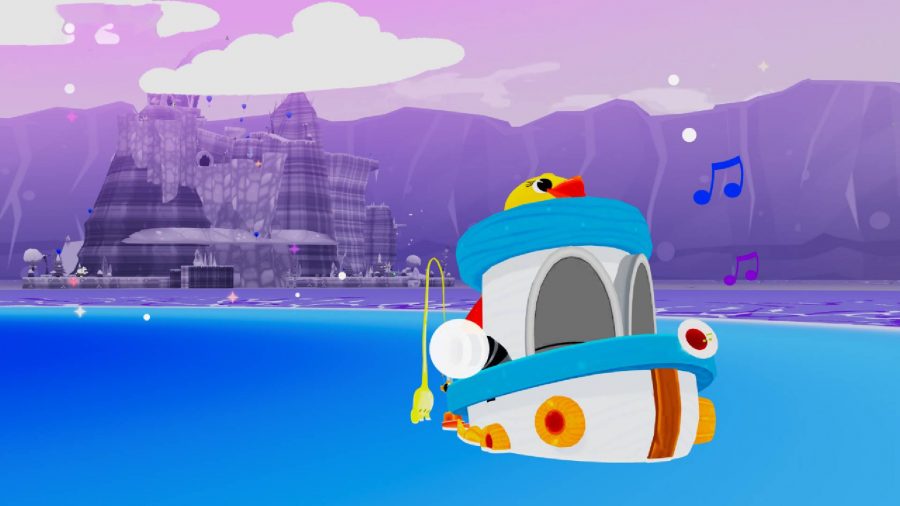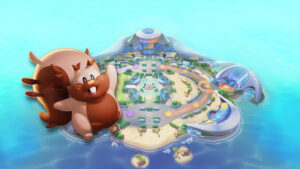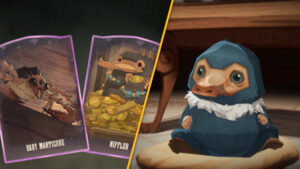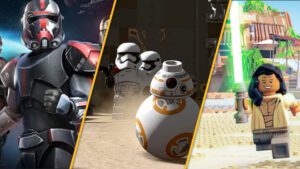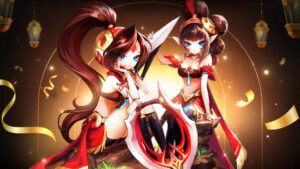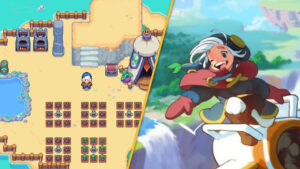Manavoid recently released Rainbow Billy: The Curse of the Leviathan on the Nintendo Switch, a charming and vividly colourful game that isn’t afraid to wear its heart on its sleeve. After the world is plunged into darkness, Billy goes on a quest to restore colour to each and every island, and the many different characters in distress.
Where the game marks its own path, however, is the complete lack of combat. Rainbow Billy instead talks to every enemy, using empathy and understanding to try and help them heal and bring colour back to the world. It’s a heartwarming narrative given extra weight through the gameplay and could help children discover some very important lessons.
So to learn more about the game, and the processes that went into its development, we sat down with two staff members from Manavoid, the developer of Rainbow Billy, and asked them some questions. We got the chance to speak with Christopher Chancey – CEO and President and Anthony Vaucheret – Art Director, and get their insight into what makes this delightful game so special.
Pocket Tactics – Rainbow Billy as a video game seems so full of character and love, what inspirations and passions did you pull from when creating this technicolour world?
Anthony Vaucheret – Initially the game was inspired by old school Disney cartoons, games like Pokemon and Zelda: Windwaker, as it grew we took tangents inspired by games like Undertale, Paper Mario, and so many more!
Christopher Chancey – We loved the idea of having the colourful personalities of cartoon characters live in a massive 3D world to explore, so we were very much inspired by games that followed cartoonish aesthetics, but with some lore and narrative depth.
The game feels so connected to childhood ideas of naivety, but also pure trust and love. It feels more like a kids television show than a typical video game, which makes it stand out in a great way. How did you find trying to keep that enthusiasm, and honesty, throughout development? Especially after a tough year.
AV – Well to be completely honest, I’m a complete man-child, haha. I love figurines, collectables, toys, video games, and all that jazz. So for the enthusiasm part, that was a no-brainer, this was exactly the kind of game that I’ve always dreamed of making! We also have these positive values as a studio, so it wasn’t a stretch for us to lean into the wholesomeness in the game.
CC – I think our character, Billy, helped us look at tough times through the lens of a child. When you take away all of the politics or past experiences and cut to the core of an issue like a child would, things get a lot easier. Honestly, working on this game was a blast and a healthy respite from everything going on in the outside world.
The choice to omit any violence is interesting. Was that set in stone from the beginning, or did you toy with any elements of combat along the way? And how did the idea come about?
CC – We were a little tired of seeing the same things over and over again in video games. We wanted to showcase how much you can do and the different stories you can tell through games as a medium. Gamesindustry.Biz wrote in 2019 that only 17% of games showcased at E3 that year were non-violent, we thought that was crazy. So we decided to be a part of the change we want to see in our industry.
Rainbow Billy being non-binary is a very simple, but lovely, bit of inclusivity. I’d love to hear more about the choices behind that, and the team’s commitment to representation overall. What is the driving force behind your push for inclusivity?
AV – We began developing the game very mechanically driven. Me and Chris argued a lot about colours or no colours at the beginning of the game, so we compromised and the world would start out in black-and-white and it’d be up to us to recolour it!
CC – As we were developing the game, we discovered that a lot of what we were building could relate to a child’s quest for identity. The Leviathan (patriarchal figure) wants everything to be in black-and-white (binary, old-school thinking), whereas Billy keeps their colour and unicity. Through dialogue and compassion, Billy surrounds themself with friends who understand them, grows stronger and in the end is able to rise above by bringing back colour (unicity) to the world.
We wanted everyone to be able to project themselves into the character of Billy, but we also really wanted to be respectful of the process of discovering your gender identity at a young age. That’s why we surrounded ourselves with consultants, like Annie Pullen Sansfacon, who’s a university professor and world-renowned researcher on trans children. She helped a lot in the direction of the story, to make sure we were representing these communities the right way. We learned a ton working on this project!
We wanted everyone to be able to project themselves into the character of Billy
Representation is important. As a white heterosexual male, I had a plethora of people I could look up to and wish to become when I was a child. I think it’s extremely important to have diverse positive figures that kids from every community would want to emulate. Our industry is getting better at this, but there is still work to be done.
While the colourful cast and the fun style show this is a kids game, the writing and topics don’t condescend to the player, instead, talking about emotions and mental health in a frank and helpful way. What do you hope children can learn from playing Rainbow Billy?
CC – The game is definitely not only for children, but really for people of all ages. We live in a time where a lot of society is polarized and at each other’s throats. We yell in great big echo chambers on social media and can barely have a dialogue there… With this game, we hope our players can learn to have some empathy and that they can feel the power of listening and communicating respectfully to bring people together! If we can do that with just a few people, I think we’re leaving society in a bit of a better place.
You seem to have put so much love into Rainbow Billy, especially with such compassionate and thoughtful writing. Despite Rainbow Billy obviously being very fantastical, how much of the developers own experience bled over into the game?
AV – The entire team put a ton of effort into the stories you see in all of the characters of Rainbow Billy. It really shows in the game, all the way to the credits!
For myself, Billy’s quest for identity is tied to personal stories of mine. My father came out as a homosexual when I was a child and was shunned by my mother who was a very old-school religious person. I grew up hating my estranged father for things I didn’t understand. When I was older and started forging my own identity and perspectives, I realized that my father wasn’t evil at all, just different. My mother’s experiences led her to believe certain things that weren’t my beliefs anymore and I managed to reconnect with my father and soften my mother’s stance. Today we share a good relationship.
In the end, this game is about empathy. We want people to understand that no one is the enemy of their own story. We all have different backgrounds, perspectives and beliefs, but the most important thing is to be able to communicate respectfully and to celebrate everybody’s differences.
Finally, the game industry has seen a huge uptick in ‘wholesome’ games recently. Why do you think more people are making, and enjoying these games. And what do you hope to bring to players through your game?
CC – Video games, like all art forms, are a reflection of society. When society changes, art changes with it. I think we’re seeing more wholesome games because there are a lot of things that we want to see change in society. We want to be more positive, wholesome, there are themes and stories that have been overdone and we want to see something different.
First, we hope people who play Rainbow Billy just have fun. The game isn’t meant to be pandering or a moral lesson, it’s just a really fun game at its core!
If you ARE interested in a deeper meaning, then we hope that the systems and feedback loops we’ve put into the game make you feel good, positive and that players can see themselves in some of the characters they are interacting with.
Finally, if you can come out of the experience wanting to listen to someone else who might be going through a tough time without judging them, or just generally having a bit more empathy in life, then I think that would be awesome!

If you enjoyed this piece, why not check out our other features like our Suda 51 Interview and Spiritfarer interview with Creative Director Nicolas Guérin.
Source: https://www.pockettactics.com/rainbow-billy/interview
- "
- 2019
- 3d
- All
- Art
- Bit
- Black
- BRIDGE
- Building
- cartoon
- cartoons
- ceo
- change
- child
- Children
- communicate
- Communities
- community
- compassion
- Creating
- Creative
- despite
- Developer
- developers
- developing
- Development
- DID
- Director
- discovered
- Disney
- driven
- driving
- e3
- echo
- emotions
- Empathy
- enthusiasm
- experience
- Experiences
- faces
- Features
- Figure
- full
- fun
- game
- game industry
- gameplay
- Games
- Gender
- good
- great
- Health
- How
- HTTPS
- huge
- i
- idea
- Identity
- important
- Inclusivity
- industry
- IT
- kids
- LEARN
- learned
- Led
- Listening
- love
- Making
- Media
- medium
- Members
- Mental health
- mine
- mother
- Nintendo
- Nintendo Switch
- Other
- Paper
- People
- perspectives
- play
- player
- players
- Playing
- pokemon
- politics
- Positive
- power
- president
- Process
- project
- quest
- relationship
- representation
- rise
- School
- SEA
- set
- Share
- Simple
- small
- snow
- So
- Social
- social media
- Society
- start
- started
- Stories
- Switch
- Systems
- tactics
- talking
- Talks
- television
- The
- the world
- Thinking
- thumbnail
- time
- Ton
- Topics
- toy
- Trust
- university
- us
- Video
- video games
- What
- What is
- WHO
- Work
- world
- writing
- year
- youtube
